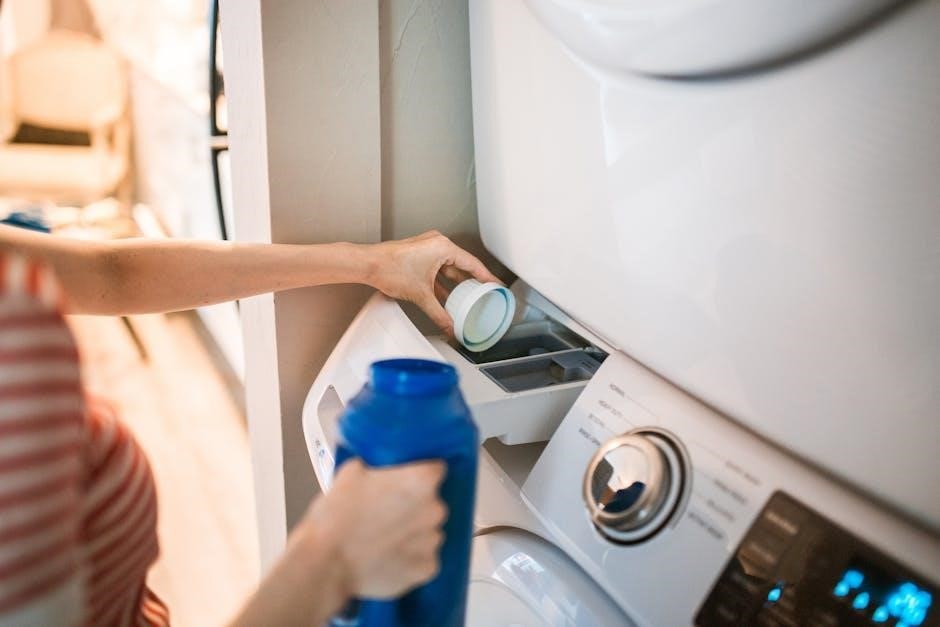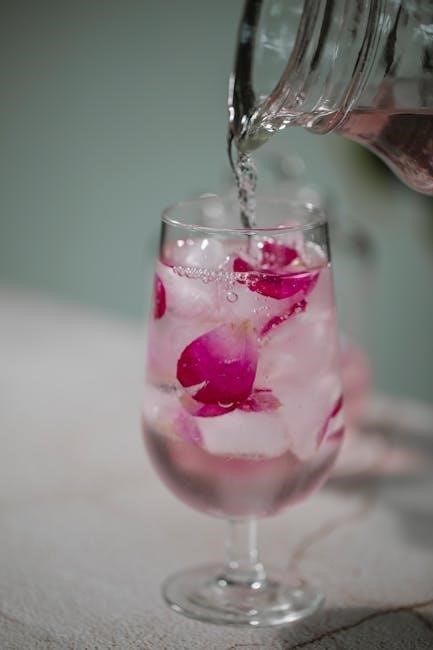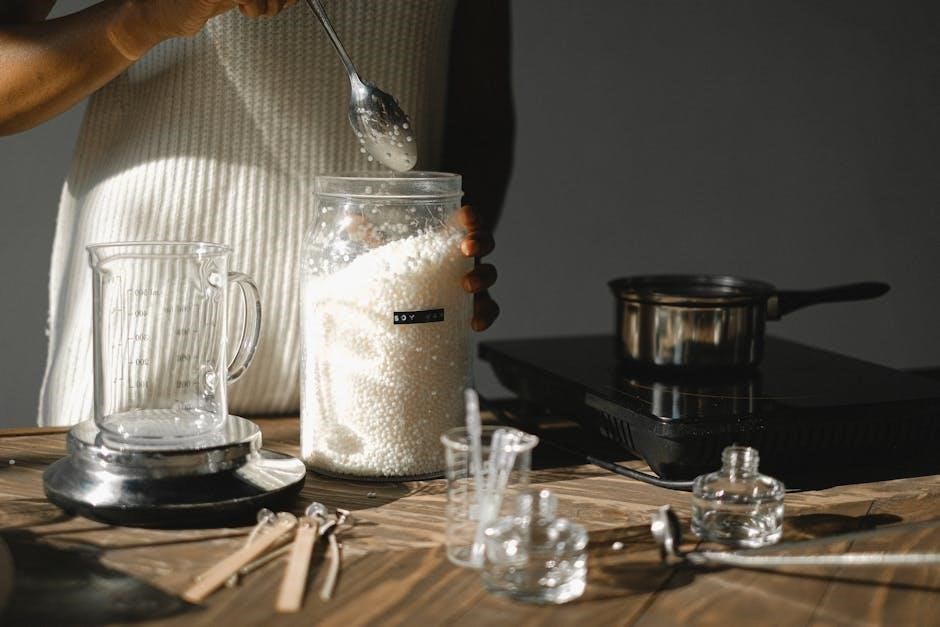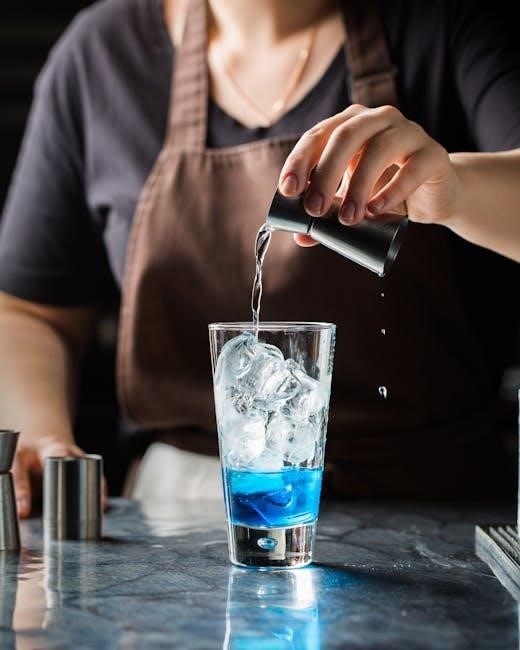Diverticulitis is a digestive condition requiring careful dietary management. A structured meal plan, like those in a diverticulitis recipe book, aids recovery by reducing symptoms and promoting healing through balanced nutrition.
Understanding Diverticulitis and Its Impact on Digestive Health
Diverticulitis involves inflammation of the digestive tract, often affecting the colon. It can cause severe symptoms like abdominal pain, bloating, and changes in bowel habits. Proper dietary management is essential to reduce discomfort and prevent complications. A structured approach, such as using a diverticulitis recipe book, helps individuals navigate dietary restrictions and promote healing, ensuring long-term digestive health and well-being.

How Diet Plays a Crucial Role in Managing Diverticulitis
Diet is a cornerstone in managing diverticulitis, helping reduce inflammation and prevent complications. During active flares, a low-fiber diet minimizes digestive strain, while a gradual increase in fiber supports long-term health. Structured meal plans, such as those found in a diverticulitis recipe book, provide guidance on balancing nutrients and avoiding trigger foods. Expert nutritionists recommend tailored approaches to alleviate symptoms and promote healing, ensuring a personalized path to recovery and digestive well-being.

Benefits of Using a Diverticulitis Recipe Book
A diverticulitis recipe book offers expert guidance, structured meal plans, and delicious, easy-to-prepare recipes tailored to manage symptoms and promote healing, ensuring a balanced and safe diet.
Why a Structured Meal Plan is Essential for Recovery
A structured meal plan is crucial for managing diverticulitis, as it guides food choices and ensures proper nutrition. Expert-recommended recipes simplify meal preparation, focusing on balanced and safe options. These plans often include phases, starting with low-fiber diets to allow healing, gradually introducing high-fiber foods for long-term health. By adhering to such a plan, individuals can manage their condition effectively, promoting overall digestive well-being.
How to Choose the Right Recipes for Your Dietary Needs
Choosing the right recipes involves aligning them with your dietary phase and health requirements. During acute flares, opt for low-fiber, easily digestible meals. Post-recovery, incorporate high-fiber foods gradually. Select recipes that avoid trigger foods like seeds, nuts, and corn. Consider expert-recommended meal plans tailored to your condition, ensuring balanced nutrition and flavor. This approach helps manage symptoms and supports long-term digestive health effectively.

Key Ingredients and Foods to Include in Your Diet
Incorporate lean proteins, whole grains, and vegetables like spinach and carrots. Include anti-inflammatory foods such as omega-3 rich fish and avocados. Avoid trigger foods like seeds and nuts.
Low-Fiber Foods Recommended During Active Flares
During active diverticulitis flares, opt for low-fiber foods to minimize digestive strain. Include cooked vegetables like carrots and spinach, lean proteins such as chicken or fish, and refined grains like white rice or pasta. Avoid seeds, nuts, and raw vegetables. Incorporate gentle options like compote de rhubarbe or casserole de morue, as suggested in diverticulitis recipe books, to support healing and reduce discomfort during recovery phases.
High-Fiber Foods to Incorporate for Long-Term Health
For long-term health, gradually introduce high-fiber foods like whole grains, steamed vegetables, and legumes to strengthen digestion. Incorporate gentle options such as cooked spinach, carrots, and quinoa, as suggested in diverticulitis cookbooks. These foods help prevent future flares by promoting regular bowel movements and improving gut health. Hydration is key to fiber absorption, ensuring nutrients are effectively utilized for overall well-being.

Dietary Principles for Managing Diverticulitis
A structured diet focusing on balanced nutrition, hydration, and fiber management is key to managing diverticulitis. Avoid trigger foods and emphasize gentle, nutrient-rich options to support digestive health.
Understanding the Difference Between Soluble and Insoluble Fiber

Soluble fiber dissolves in water, forming a gel-like substance that softens stools and reduces irritation in the digestive tract. Insoluble fiber, however, remains intact, adding bulk to stools and preventing constipation. For diverticulitis management, soluble fiber is often recommended during active flares to minimize discomfort, while insoluble fiber is gradually introduced to support long-term digestive health and prevent complications.
Hydration and Its Role in Preventing Diverticulitis Symptoms
Proper hydration is essential for preventing diverticulitis symptoms by softening stools and reducing pressure on the digestive system. Drinking plenty of water helps soluble fiber function effectively, easing digestion and minimizing irritation. Staying hydrated also prevents constipation, a common trigger for diverticulitis flares. Incorporating water-rich foods and herbal teas into your diet, as suggested in diverticulitis recipe books, can further support digestive health and overall well-being.

Sample 4-Week Meal Plan for Diverticulitis Management
A structured 4-week meal plan guides recovery, starting with low-fiber foods during flares and gradually introducing high-fiber options to support long-term digestive health and symptom management.
Breakfast, Lunch, and Dinner Ideas for Each Phase of Recovery
Breakfast options include scrambled eggs, low-fiber cereals, or smoothies; Lunches might feature steamed vegetables, lean proteins, and soft whole grains. Dinners could include baked fish, mashed potatoes, or stir-fried tofu. Each phase tailors meals to digestive tolerance, ensuring nutrients are absorbed without triggering symptoms. This structured approach supports healing and prevents complications, offering balanced and delicious choices for every stage of recovery.
Snacks and Desserts That Align with Diverticulitis-Friendly Diets
Gentle snacks like low-fiber fruits, such as bananas, or steamed vegetables are ideal. Desserts can include options like compote de rhubarbe or baked apples, which are easy to digest. These choices align with dietary needs, providing comfort without triggering symptoms. Incorporating such treats ensures variety and satisfaction while supporting digestive health throughout recovery.
Quick and Easy Recipes for Busy Individuals
Simple, fast recipes like steamed vegetables or baked fish offer convenient meal solutions. These dishes are designed to be prepared quickly, ensuring easy digestion and minimal prep time.
Simple Meal Preparations That Reduce Kitchen Time
The book offers quick, easy recipes like steamed vegetables and baked fish, minimizing prep and cooking time. These meals use minimal ingredients and simple methods, ensuring they fit into busy schedules while aligning with dietary needs for diverticulitis management. Recipes such as compote de rhubarbe and casserole de morue à la provençale are designed to be both nutritious and time-efficient, making meal prep straightforward and stress-free.
One-Pot Meals and Slow Cooker Recipes for Convenience
The book features one-pot meals and slow cooker recipes, ideal for busy individuals. Dishes like casserole de morue à la provençale and hearty stews simplify cooking, requiring minimal supervision. These recipes blend flavors while adhering to dietary guidelines, ensuring meals are both nourishing and easy to prepare. Slow cooking allows for tender, digestible foods, perfect for managing diverticulitis symptoms without sacrificing taste or convenience.

Managing Symptoms Through Nutrition
Nutrition plays a key role in reducing inflammation and promoting healing. Tailored recipes, such as compote de rhubarbe and julienne de betteraves, support digestive health gently and effectively.
Foods That Reduce Inflammation and Promote Healing
Certain foods, like compote de rhubarbe and steamed vegetables, help reduce inflammation and support healing. These gentle, easily digestible options are rich in antioxidants and fiber, aiding the digestive system. Expert-recommended recipes, such as julienne de betteraves and casserole de morue, provide essential nutrients without irritating the gut. Incorporating these into your diet can alleviate symptoms and promote long-term digestive health, as suggested by nutritionists like Cédric Menard.
Nutritional Supplements to Support Digestive Health
Nutritional supplements like fiber, probiotics, and omega-3 fatty acids can enhance digestive well-being. Fiber aids in softening stools, while probiotics promote gut flora balance. Omega-3s reduce inflammation, supporting overall intestinal health. These supplements, combined with a tailored diet, can alleviate diverticulitis symptoms and prevent future flare-ups, as recommended by experts like Cédric Menard in their specialized recipe books.

Foods to Avoid During Diverticulitis Flares
During active flares, avoid foods like seeds, nuts, and whole grains, as they can irritate the digestive tract. Opt for low-fiber alternatives to reduce discomfort.
Identifying Trigger Foods That Can Worsen Symptoms
Trigger foods such as seeds, nuts, and whole grains can exacerbate diverticulitis symptoms by irritating the digestive tract. Processed foods, high in sugar and fat, should also be avoided as they can slow digestion and worsen discomfort. Identifying these triggers is crucial for managing symptoms effectively and promoting healing. A well-structured diet, as outlined in many diverticulitis recipe books, helps minimize flare-ups and supports long-term digestive health.
Alternatives to Common Irritants in Your Diet
Replace trigger foods with gentle, easily digestible options like cooked vegetables, lean proteins, and low-fiber grains. Incorporate soft-cooked meals and pureed dishes to reduce irritation. Recipes in diverticulitis-focused cookbooks often suggest alternatives such as tender meats, fish, and low-FODMAP vegetables. These choices help minimize discomfort while providing essential nutrients for healing and overall well-being.
Expert Contributions and Testimonials
Expert nutritionists and gastroenterologists endorse these recipes, offering testimonials on their effectiveness. Cédric Menard and Dr. Martine Cotinat provide easy, nutritionally balanced meals for diverticulitis management.
Insights from Nutritionists and Gastroenterologists
Nutritionists like Cédric Menard emphasize the importance of tailored recipes for diverticulitis, focusing on low-fiber diets during flares and gradual reintroduction of high-fiber foods. Gastroenterologists, including Dr. Martine Cotinat, highlight the role of anti-inflammatory ingredients and proper hydration in managing symptoms. Their expertise ensures that these recipes are both delicious and medically sound, providing a comprehensive approach to digestive health.
Success Stories from Individuals Managing Diverticulitis
Many individuals have found relief from diverticulitis symptoms by following structured meal plans from recipe books. These personal stories highlight how tailored diets, featuring low-fiber and anti-inflammatory foods, have improved digestion and reduced flare-ups. By focusing on easy-to-prepare recipes, these individuals have regained control of their digestive health, demonstrating the practical benefits of a well-designed nutritional approach.
Maintaining a healthy lifestyle and exploring educational resources can empower individuals to manage diverticulitis effectively, ensuring long-term digestive well-being and reducing symptom recurrence.
Maintaining a Healthy Lifestyle Beyond the Meal Plan
Maintaining a healthy lifestyle involves regular physical activity, stress management, and mindful eating. Incorporate hydration, fiber-rich foods gradually, and avoid trigger foods. Monitor symptoms and adjust habits accordingly. Engage in activities that promote mental well-being, such as yoga or meditation, to reduce stress. Regular check-ups with a healthcare provider ensure ongoing support and personalized advice for long-term digestive health and overall wellness.
Resources for Ongoing Support and Education
Accessing resources like cookbooks, online forums, and expert guides can provide ongoing support. Books such as Mes recettes faciles pour les diverticules coliques by Cédric Menard offer tailored recipes. Websites like www.fnac.com and Cultura allow easy purchase of these resources. Engaging with communities and purchasing guides ensures continued education and practical advice for managing diverticulitis effectively, promoting long-term wellness and digestive health.
